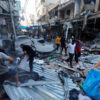Water and sanitation services in Gaza are on the verge of collapse, putting children at grave risk of disease outbreaks, according to a warning from the United Nations Children’s Fund (UNICEF). The ongoing bombardment by Israel has severely limited access to clean water and sanitation, leaving displaced people in the southern Gaza Strip with only 1.5 to 2 liters of water per day – well below the recommended requirement for survival. The destruction of infrastructure and limited aid deliveries have exacerbated the crisis, leaving vulnerable children in a dire situation.
The relentless onslaught by Israel has forced hundreds of thousands of people, including an estimated half of them children, into the city of Rafah since early December. These displaced individuals are in desperate need of essentials such as food, water, shelter, medicines, and protection, as stated by UNICEF. However, the rising demand has overwhelmed the already critical state of water and sanitation systems in the city. While 3 liters of clean water per day are necessary for survival, this amount increases to 15 liters when considering water needed for washing and cooking.
UNICEF Executive Director Catherine Russell emphasized the life-and-death importance of access to clean water, stating that children in Gaza “have barely a drop to drink.” Many families are resorting to using water from unsafe sources that are highly salinated or polluted, putting children at a dramatic risk of waterborne diseases, dehydration, and malnutrition. The inadequate humanitarian aid deliveries fail to meet the basic survival needs of the population, exacerbating the shortage of water and hygiene products. Additionally, the destruction of sanitation facilities and the inability to accommodate the large number of displaced Palestinians further worsens the situation.
Russell expressed the urgent need for supplies to repair damaged water systems, highlighting the impact of constant bombing and restrictions on materials and fuel allowed into Gaza. Without critical progress in addressing these challenges, the spread of disease and epidemics looms as a significant threat. Data from the World Health Organization (WHO) reveals a concerning increase in cases of diarrhea, with a 66 percent jump in children under five and a 55 percent increase in the rest of the population between November 29 and December 10. The WHO has also reported cases of meningitis, chickenpox, jaundice, and upper respiratory tract infections, indicating the severity of the health crisis in Gaza.
However, it is important to note that the figures may not provide the full picture due to the collapsing health system and other services in Gaza. Doctors and aid workers have long been warning about the dire consequences of the ongoing conflict and the urgent need for international support. UNICEF’s warning serves as a reminder of the urgent action required to address the water and sanitation crisis in Gaza and to protect the lives of vulnerable children.




